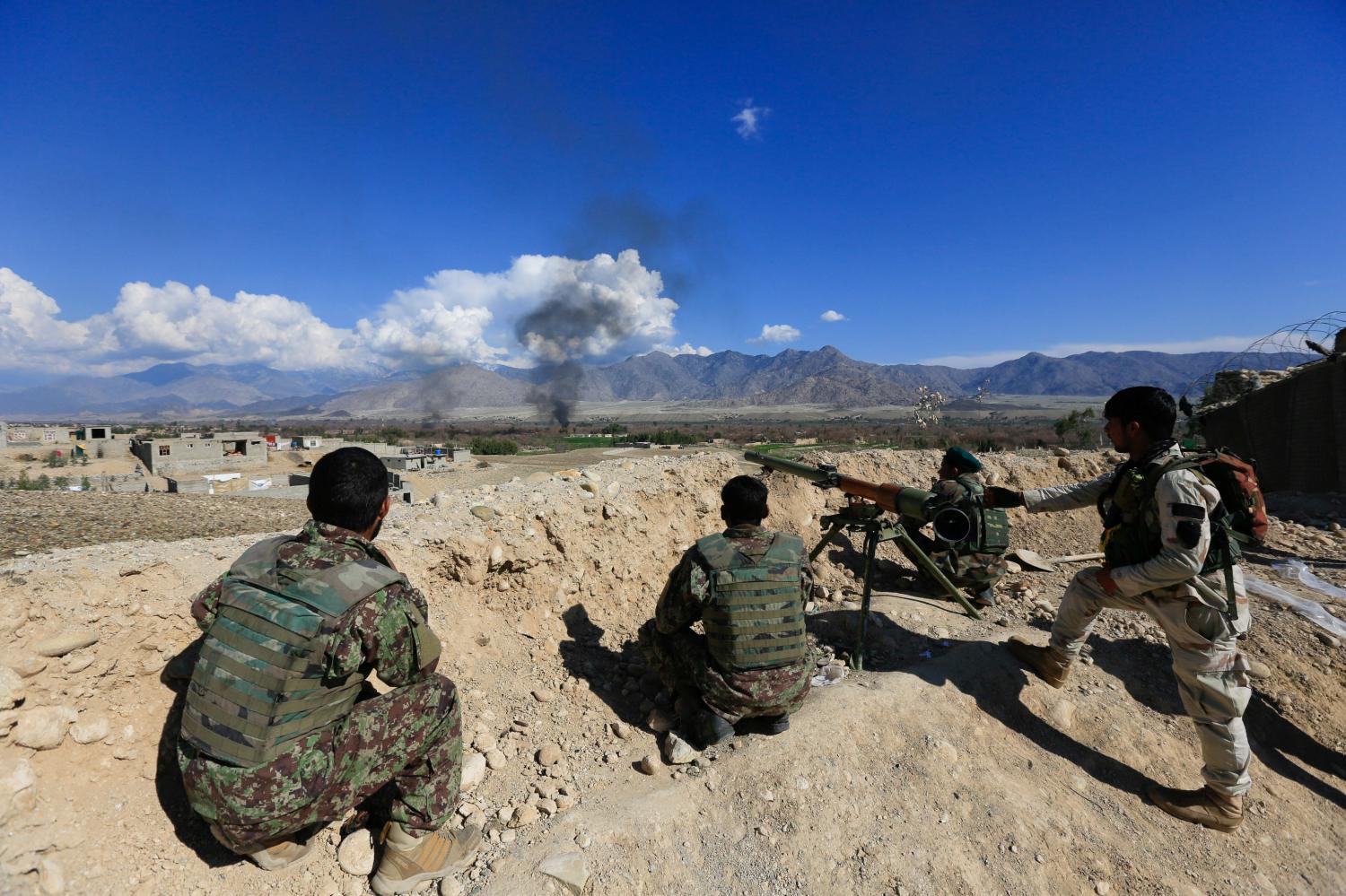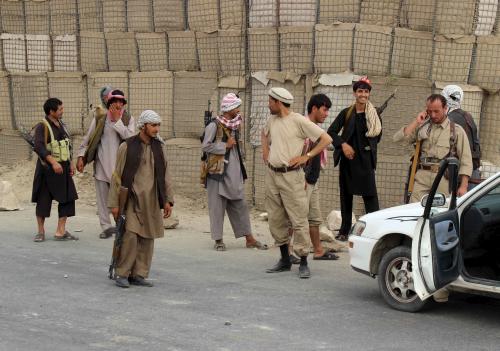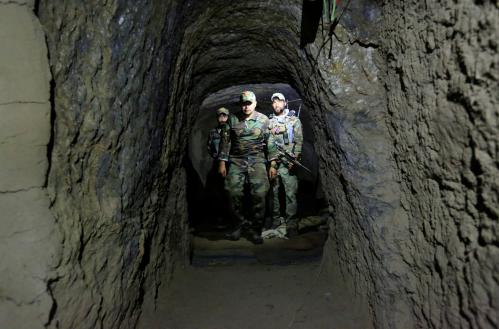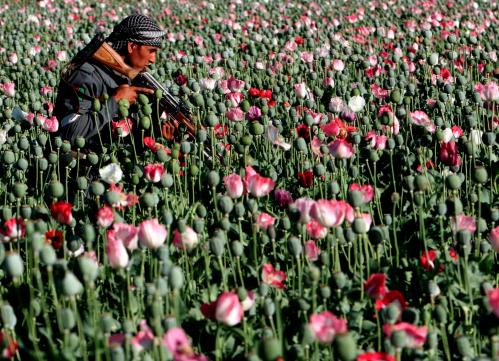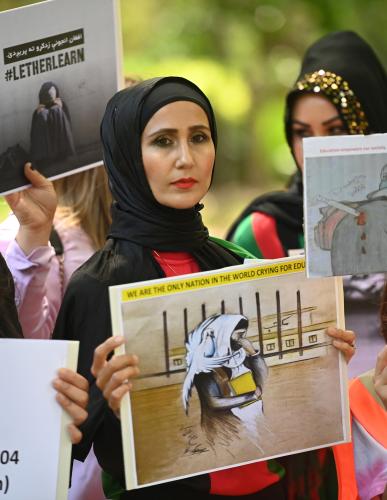In “Afghanistan Affectations,” a detailed report published by the United Nations University Centre for Policy Research’s Crime-Conflict Nexus Series in April 2017, Vanda Felbab-Brown assesses how counterinsurgency, stabilization, and reconstruction dynamics have interacted with organized crime, illicit economies, and generalized predatory criminality since 2001 and warped and weakened the post-conflict stabilization and reconstruction efforts.
The transition choices by the Afghan government and the international community, particularly the embrace of problematic warlords for the sake of short-term military battlefield advantages and as tools of political cooptation, shaped and reinforced criminality and corruption in post-2001 Afghanistan and thus delegitimized the post-Taliban political dispensation.
The analysis identifies four possible inflection points where the international community and the Afghan government could have fundamentally altered the course after the initial choices of the informal distribution of power and its connections to criminality were made in 2001. These four possible inflection points provided opportunities for tackling corruption and criminality in order to limit power abuse and strengthen the rule of law and political inclusiveness—namely: (1) the 2004 disarmament effort; (2) the beginning of the Obama administration and its surge of resources in Afghanistan; (3) the 2014 formation of the National Unity Government (NUG), whose two protagonists crucially campaigned on an anti-corruption platform; and (4) the 2015 missed opportunity to react resolutely to the Taliban’s takeover of Kunduz City.
But the international community and the Afghan government failed to take advantage of these possible inflection points. Or, to the extent that they tried, such as during the first two years of the Obama administration, other strategic directives, timelines, and imperatives interfered with them and directly contradicted them. Thus, the anti-corruption and anti-criminality efforts were not underpinned by political heft and power, such as cutting off aid to or otherwise sanctioning particular powerbrokers. Hence pernicious individual powerbrokers and the political system quickly learned how to ride the anti-corruption and anti-crime efforts, further delegitimizing system and enabling a significant intensification of the Taliban’s insurgency in Afghanistan.
No doubt, the Taliban itself has become deeply involved in all kinds of illicit economies, including drugs, timber, and gems. This involvement has grown over time despite the fact that since its inception in 1994, and as a product of the brutality and chaos of the 1990s civil war, the Taliban defined its purpose as improving governance in Afghanistan and acting against the rampant criminality that swept the country.
Indeed, during the administration of President George W. Bush, it was the Taliban’s involvement in the drug economy that received most international attention out of all the illicit economies, corruption, and predatory criminality that went on in Afghanistan. Yet the counternarcotics policies which were chosen both failed to accomplish their stated goal of bankrupting the Taliban and turned out to be highly counterproductive. Far from delegitimizing the Taliban in the eyes of local populations as a mere cartel or as narcoguerrillas, efforts to eradicate opium poppy cultivation as well as particular designs of drug interdiction allowed the Taliban to present itself a protector of people’s livelihoods and thereby to obtain significant political capital. Thus, the international community mounted the most intense efforts precisely against the wrong type of illicit economy and criminality: the labor-intensive poppy cultivation that underpins much of the country’s economic growth and provides elemental livelihoods and human security to vast segments of the rural population.
Instead, the anti-crime efforts should have focused on the predatory criminality.
Although the NUG raised expectations of justice and an accountable government delivering services and, crucially, combatting corruption and power abuse, it has so far failed to deliver robustly on any of these promises. One reason is that President Ashraf Ghani and CEO Abdullah Abdullah were of course deeply beholden to corrupt elites without whose support they would not have been able to run in the elections, and on whose support they continued to depend after the elections. Thus not even one notorious powerbroker, two and half years after the formation of the NUG, has been prosecuted or even dismissed and marginalized. Moreover, immediately after its creation, the NUG was paralyzed by infighting between the two men and their factions.
Ghani’s unwillingness and inability to move against powerbrokers deeply implicated in criminality and corruption was also driven by his decision early in his administration to prioritize outreach to Pakistan, and through Pakistan to negotiate a peace with the Taliban. Like Karzai, Ghani came to see Pakistan as the magic key to the negotiated deal, and, like Karzai, he became bitterly disappointed by and frustrated with Pakistan in his first two and half years, with negotiations getting no traction and terrorism and militancy only escalating in Afghanistan and sapping Ghani’s political capital.
Thus the anticrime and anticorruption measures that Ghani and the NUG did undertake have hardly been robust and momentous enough. Ghani’s reopening of the notorious case of the fraudulent Kabul bank did not increase asset recovery and Ghani even sought to make an economic deal with the chief perpetrator of the Kabul bank fraud. With determined international assistance and under international pressure, Ghani’s decision to suspend and clean up a $1 billion fuel contract for the Afghan Ministry of Defense was more successful.
However, this important case has not yet translated into a broader clean-up of the massive corruption that still pervades the Afghan security forces, nor has it generated any meaningful follow-up on anti-corruption follow-up or corruption deterrent effects. The tangle of ethnic divisions and rifts and competing patronage networks that for years have run through the Afghan security forces complicate any anti-corruption efforts.
Under pressure from the international community, which was frustrated with the meager progress in fighting corruption and combatting politically-linked organized crime, and with an eye toward an important donors’ conference in Brussels in October 2016, and under pressure from donors, the NUG established a specialized anti-corruption court, the so-called Anti-Corruption Justice Center (ACJC). However, the ACJC has so far not tried any major cases. Perhaps the most significant anti-corruption and anti-crime accomplishments has been in tax and custom revenue recovery, both of which collapsed in 2014, with theft of revenues vastly surpassing the normal 50 percent theft that characterized the Karzai era. The resulting revenue collection collapse debilitated the Afghan government in 2015, once again highlighting how crucial a more efficient collection of tax and custom revenues is for the functioning of the Afghan state. In 2015, Afghanistan’s government succeeded in delivering a spectacular turnaround in revenue generation: from an eight percent drop in 2014 to a 22 percent rise in 2015.
However, these anti-corruption and anti-crime moves have not been anywhere near sufficient to robustly strengthen the functionality of the Afghan government or to reduce the Taliban’s anti-crime, anti-corruption, and pro-order narrative. Nor have they help to reverse a steadily deteriorating security situation in Afghanistan. Indeed, as of the writing of this report in February 2017, the Taliban is at its strongest point since 2001, with the Afghan National Security Forces (ANSFs) also weakened and undermined by pervasive corruption and ethnic and patronage rifts.
Felbab-Brown provides a detailed set of recommendations, including:
- Reducing corruption and improving governance;
- Reining in the warlords and predatory criminality; and
- Maintaining a suspension of poppy eradication.
This is part of a UNU-CPR Series on the Crime-Conflict Nexus. To access the full series, please click here.
This material has been funded by UK aid from the UK government; however the views expressed do not necessarily reflect the UK government’s official policies.
The Brookings Institution is committed to quality, independence, and impact.
We are supported by a diverse array of funders. In line with our values and policies, each Brookings publication represents the sole views of its author(s).

